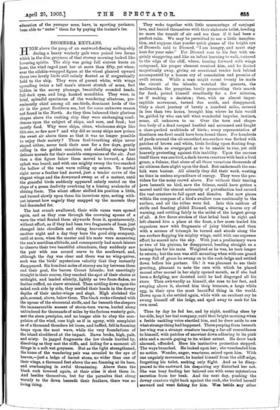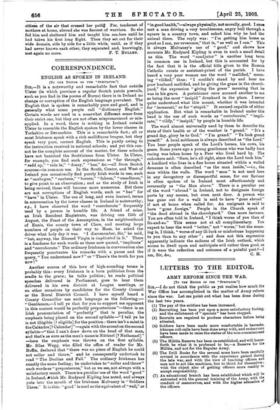DIOMEDEA EXUL ANS.
HIGH above the poop of an eastward-fleeing sailing-ship during a heavy westerly gale were poised two forms which in the dim greyness of that stormy morning looked like hovering spirits. The ship was going full sixteen knots an hour, the wind raged past her at more than fifty, yet when- ever the oilskin-wrapped figure at the wheel glanced upward those two lovely birds still calmly floated as if magnetically held to the ship. They were of purest white, with wings spreading twice a tall man's utmost stretch of arms, feet hidden in the snowy plumage, beautifully rounded heads, full dark eyes, and long, hooked mandibles. They were, in brief, splendid specimens of the wandering albatross, pre- eminently chief among all sea-birds, dominant lords of the air in the great Southern sea, but for some unknown reason not found in the North. As they thus balanced their glorious shapes above the rushing ship they were exchanging confi- dences upon the subject of ships, and men, and food ; but mostly food. Why were ships, clean, wholesome ships like this one, so few now ? and why did so many ships now poison the sweet air above them so that it was no longer possible to enjoy their society ? These foul-breathing ships never stayed either, never took their ease for a few days, gently rolling in the golden sunshine, and shedding strange but delicate morsels for their sociable companions of the air. Just then a dim figure below them moved to leeward, a faint splash was beard, and with one mighty swoop the two reached the hollow of the vast wave rolling up astern. To mortal sight never a feather had moved, just a tender curve of the elegant wings and the downward sweep as of a meteor, until the graceful birds suddenly appeared calmly seated on the slope of a green declivity overhung by a hissing avalanche of shining foam. The silent officer shifted his position a little, and turned slowly upon them his incurious eyes, noting with- out interest how eagerly they snapped up the morsels they had descended for.
The last crumb swallowed, their wide vanes were spread again, and as they rose through the crowning spume of a wave the wind floated them skywards from it, spontaneously, without effort, as if they had been two fragments of foam just changed into cloudlets and rising heavenwards. Through another night and a day they bore the good ship company, until at noon, when the master and his mate were measuring the sun's meridian altitude, and consequently had much leisure to observe their two beautiful attendants, they suddenly saw the pair with one accord curve to the southward, and, although the day was clear and there was no wing-quiver, such was the birds' mysterious velocity that they instantly disappeared. Six hundred miles of stormy sea lay between them and their goal, the barren Crozet Islands ; but unerringly straight in their course, they reached the spot of their choice at midnight, and landed silently, lightly as two foam-flakes, no feather ruffled, no sinew strained. Then settling down upon the naked rock side by side, they nestled their heads in the downy depths of their under-wings and slept. High shrieked the gale, around, above, below them. The black rocks vibrated with the uproar of the elemental strife, and far beneath the sleepers the immeasurable masses of storm-torn waves, hurled along unhindered for thousands of miles by the furious westerly gale, met the stern precipice, and no longer able to obey the com- pulsion of the wind, rose high as if in agony, with complaint as of a thousand thunders let loose, and baffled, fell in foaming heaps upon the next wave, while the very foundations of the island shuddered at the impact. Dawn broke, high, pale, and misty. In jagged fragments the low clouds hurtled by, dissolving as they met the cliffs, and hiding for a moment all things in a soft wet greyness. But as the light strengthened, the home of the wandering pair was revealed to the eye of heaven,—just a ledge of barest stone, no wider than one of their wings, a thousand feet above the sea foaming at its base, and overhanging in awful threatening. Above them the black rock towered again, at their sides it shut them in. And besides themselves, but for the parasites that clung warmly to the down beneath their feathers, there was no living thing. They woke together with little murmurings of conjugal love, and busied themselves with their elaborate toilet, heeding no more the tumult of air and sea than if it had been a perfect calm. We may be permitted to use a little imagina- tion, and suppose that yonder quick glance of the bright eye of Diomeda said to Diomed, " I am hungry, and must stay here for your sake." For Diomed rose to his feet with un- gainly staggering, and like an infant learning to walk, tottered to the edge of the cliff, where, leaning forward with wings outspread, his proper element received him, and he floated majestically away, giving an occasional tender look behind accompanied by a hoarse cry of consolation and promise of swift return. While a man might count twenty he made the circuit of the islands; watched the gannets, the mallemucks, the penguins, busily prosecuting their searoh for food; poised himself steadfastly for a few minutes, as if making a decision ; then, with an almost imper- ceptible movement, turned due south, and disappeared. Only a short journey of barely a hundred miles, covered in less than two hours, brought him where he fain would be, guided by who can tell what wonderful impulse, instinct,. sense, all unknown to us. Over the torn and shape- less body of a dead rorqual hustled and screamed and fought a close-packed multitude of birds ; every representative of Southern sea-fowl could have been found there. For hundreds of yards around the oil-smoothed sea-surface was flecked with patches of brown and white, birds feeding upon floating frag. ments, birds so overgorged as to be unable to rise, yet still hoarsely protesting against this inability. Upon the carcase itself there was one bird, a dark-brown creature with beak a livid green, a fulmar, that alone of all those voracious thousands of air citizens dare alight upon the dead. But underneath the sea- folk were busiest. All silently they did their work, wasting no time in useless expenditure of energy. They were the pro- viders for the noisy crowd above. For without their tearing jaws beneath no bird, save the fulmar, could have gotten a morsel until the utmost extremity of putrefaction had caused the vast creature to fall apart and dissolve. But now pieces within the compass of a bird's swallow rose continually to the surface, and all the tribes were fed. Into this caldron of strife and feasting glided Diomed, uttering a hoarse cry of warning, and settling fairly in the midst of the largest group of all. A few fierce strokes of that lethal beak to right and left cleared him a place at the feast, a few more loaded his capacious maw with fragments of juicy blubber, and then with a scream of triumph he turned and strode along the sea. surface flapping his mighty wings, until with one supreme effort he soared into the sky. With just a preliminary wave or two of his pinions, he disappeared, heading straight as a homing-bee for his mate. Weighted as he was, he took longer to return; but the sun was still mounting when with one grand sweep full of grace he swung on to the rock-ledge and settled down before his partner. Oh ! it was pleasant to see their greeting, pleasant to note the care with which he placed morsel after morsel in her shyly opened mouth, as if she had been a fledgling, nor desisted until he had disgorged all his store. Then awkwardly as himself, she rose to her feet, and swaying above it, showed him them treasure, a large white egg, in their eyes the most beautiful thing ha the world. Down upon it she settled again, while with an exultant cry he swung himself off the ledge, and sped away to seek for his own meal.
Thus by day he fed her, and by night, nestling close by her side, kept her leal company, until that bright morning when a feeble cackling voice startled him, and he drew aside to see what strange thing had happened. There peeping from beneath her wing was a strange creature bearing a far-off resemblance to himself, with patches of snowiest down adhering to its pink skin and a mouth gaping to its widest extent. He drew back alarmed, offended. Here his instinctive protection stopped. The ways branched. He looked upon her ; she vouchsafed him no notice. Wonder, anger, weariness, seized upon him. With one ungainly movement, he hurled himself from the cliff-edge, forgetting his toilet, seeking only flight. And as he disap- peared to the eastward his despairing cry disturbed her not. She was busy feeding her beloved one with some mysterious secretion from her beak. And the next day, pushing the downy creature right back against the rock, she hurled herself seaward and went fishing for him. Woe betide any other
citizen of the air that crossed her path!! For, tenderest of mothers at home, abroad she was fiercest of warriors. So she fed him and sheltered him and taught him sea-lore until he bad taken his first long flight. Then they set out for their wide domain, side by side for a little while, until, as if they had never known each other, they separated and, knowingly,



























































 Previous page
Previous page